 |
International Affairs
In Syria, after Assad – What?
Toby Westerman
While the carnage in Syria presented by the media is real, and Syria's ruler, Bashar al-Assad, is certainly a bloody dictator, there is inadequate discussion about what will follow if the current Syrian government falls. The result could be trading a Socialist tyrant for yet another fundamentalist Islamic regime, with horrendous consequences for Catholics and other minorities, as well as for international stability.
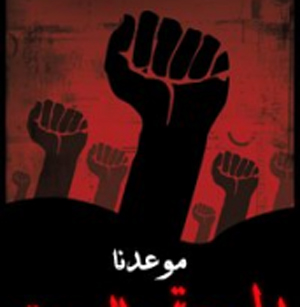
The Communist clenched fist - symbol of the revolution in Syria |
The cries for immediate involvement in the latest Syrian tragedy recall a familiar pattern that is repeating itself: a revolution against tyrannical rule produces horrific pictures that are broadcast into American homes. Understandable sympathy arises for the rebels, as does justifiable revulsion against a dictatorial regime. Action is demanded, action is taken.
After the fall of the dictator, however, the revolutionaries then begin to establish a Muslim State based upon a fundamentalist understanding of Islam, which brings new violence to the vulnerable and innocent.
This is what happened in Egypt, Libya, and Tunisia, as well as in Kosovo, which since its independence has been a haven for jihadists.
Now the pattern is being repeated in Syria.
Poorly armed rebels are losing to well-equipped military forces of Syrian strongman Bashar al-Assad. Pressure on the anti-government rebels is unrelenting. The pictures of the carnage are graphic. Calls are now coming from political leaders and influential columnists urging aid to the rebels. U.S. intervention is urged, possibly UN action. U.S. Secretary of State Hillary Clinton recently stated that Assad fits the definition of a war criminal.
The question remains, after Assad - what?
Islam extremists lead revolt
The present Syrian revolt is jihadist in nature and can be traced to 2004, when Islamic fundamentalists began a terror campaign against the Assad regime for closing jihadist infiltration trails from Syria into neighboring Iraq. The routes were used to provide assistance to jihadists carrying out actions against U.S. and U.S.-supported Iraqi forces.
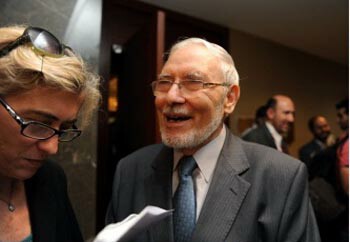
Brotherhood leader Shaqfah, above, smiles and calls for democracy, but its activists, below, show its radical goals
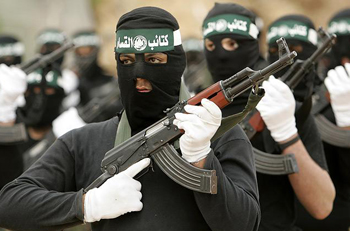
|
Assad is no friend of the United States, but his government opposed the fight for an Islamic fundamentalist Iraq on his border. Assad also did not want to further strengthen the radical Islamic movement in his own country.
As a result of the closure of the infiltration routes, one particularly influential radical Syrian Muslim cleric, Abu al-Qaqa, called for the destruction of the Assad regime, resulting in armed struggle against Assad. Al-Qaqa was later assassinated in 2007.
The Syrian Muslim Brotherhood plays a prominent leadership role in the rebellion against Assad. In an article published in 2011, the leader of the Syrian Brotherhood, Mohammad Shaqfah, stated that he seeks to emulate the Turkish model of government in Syria. "We don't want to impose anything on the people," Shaqfah asserted. "We will not replace one dictatorship with another."
What Shaqfah did not mention is that the Prime Minister of Turkey, Recep Erdogan, is actively undermining Turkey's traditional secularism. Although the majority of Turks are Muslim, the Republic of Turkey has been secular in nature since its founding in 1923 by Mustafa Kemal.
The sentiments expressed by Mr. Shaqfah can certainly be questioned, since the track record of the successful revolutions led by other Muslim Brotherhood factions in Egypt, Libya, and Tunisia do not confirm his statements.
Persecution of Catholics
In Egypt, Libya, and Tunisia, the new constitutional and governmental forms replacing the former regimes are based on Sharia law. Fear is beginning to grip the Catholic populations of those countries. A new war with Israel is increasingly likely.
Some supporters of the newly established Islamic governments are calling for the reestablishment of the Caliphate - an Islamic theocratic state with aspirations for worldwide rule.
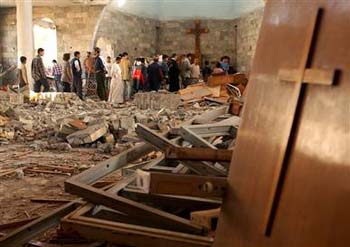
A burnt out church in Iraq; Syrian Maronite Catholics fear similar violence |
The Catholic Maronite Patriarch of Lebanon Beshara al-Rai, recently stated that the violence and bloodshed during and after the establishment of Islamic democratic states was turning the "Arab Spring" into a winter for Catholics as well as many Muslims.
Patriarch Rai, whose Maronite Church also has a strong presence in Syria, sees the presence of outside forces assisting the rebels as part of the problem.
"It's not the people who want them [the revolutions led by rebels]. There are countries behind them, supporting them financially and militarily and politically ... Moderate people do not want them," declared the Patriarch.
Patriarch Rai has grave misgivings about the outcome of a violent Muslim uprising against Assad. The Patriarch stated that despite serious faults, the Assad regime did guarantee religious freedom for all groups.
Unfortunately, the United States seems again ready to export democracy without regard to our Bill of Rights. The effects of the installation of a "democratic government" without real protection for minorities can be seen today in Iraq. After the U.S.-backed Muslim Iraqi government assumed power, fundamentalist Islamic campaigns of murder, bombings and mob violence against the Catholic minority resulted in the number of Catholics in Iraq to fall from an estimated 1.5 million to now less than 500,000.
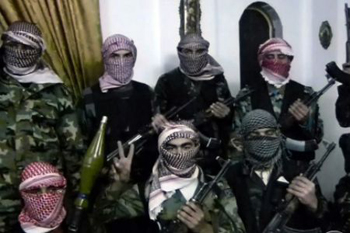
Who really are these Syrian rebels that are receiving American arms and media support? |
The violence and intimidation against Catholics and other minorities has led the United States Commission on International Religious Freedom to conclude that the "very existence" of Christianity and other minorities is in danger in the new "democratic" Iraq.
Since Muslims constitute the vast majority of voters in the Mid-East, Islamic fundamentalists have been all too pleased to use "democratic" means to achieve militant ends, with minorities left vulnerable.
The U.S. can advocate for democracy, but only on condition that the rights of faith minorities will be the same as those of the majority Muslim community.
As the situation now stands in Syria, the United States can support neither the Assad regime nor those fundamentalists seeking to overthrow it.
At least not until we know whom we are supporting.

Posted March 19, 2012
Toby Westerman publishes
International News Analysis - Today
An investigative and uncompromising weekly analysis of the world situation
Contact T. Westerman at
www.inatoday.com
or P.O. BOX 5182, Rockford, ILL, 61125-0182

Related Topics of Interest
 Not Long Ago, Pelosi Praising Assad Not Long Ago, Pelosi Praising Assad
 Middle East: Hawks and Doves in Perspective Middle East: Hawks and Doves in Perspective
 The Rise of the Neo-Communist Empire The Rise of the Neo-Communist Empire
 Still Waiting for the Spark - The Occupy Movement Still Waiting for the Spark - The Occupy Movement


|
International Affairs | Hot Topics
| Home | Books | CDs | Search | Contact Us | Donate

© 2002- Tradition in Action, Inc. All Rights
Reserved
|
 |
|